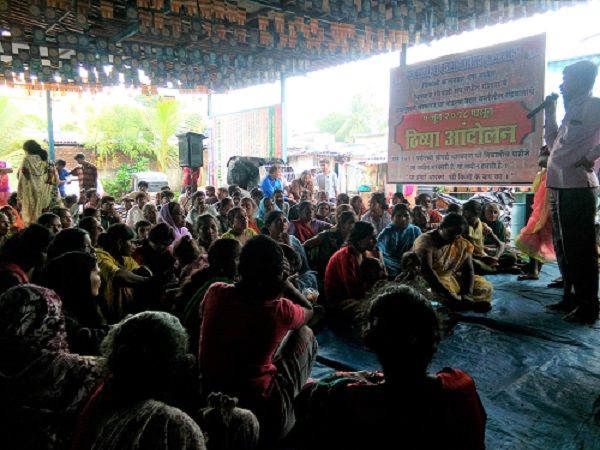Arati Kade
(This is an updated version of the report that first appeared here on Round Table India on 19 June 2018)
The Dalit community of Bhimchhaya Nagar basti in Vikhroli, Mumbai, is protesting against the demolition of their houses. They are protesting since the 5th of June, demanding protection to slum dwellers living in the Bhimchhaya, having proof of living there from 2000 to 2011. Action needs to be taken against the atrocities committed on Dalit families under the prevailing law, and compensation be paid for total losses incurred due to demolition.
The basti residents protesting for their rights live in constant fear of hooliganism, which started in the area after the protests began. These protesters are getting life threats from these hooligans, forcing them to stop the protest or to not participate. Women are mainly leading this movement – nearly hundred women are sitting on the protest site since it started. “I am from Somaiya forest basti. Since 2011, we have constant threat of demolition of our houses. Since then, I have been participating in Ghar Bachao Ghar Banao Andolan. Now I am in solidarity with the people protesting in the Bhimchhaya basti,” said Subhadra Kedar, one of the activists of movement against the demolition of the dalit Basti. People of the basti protesting for their rights are in the continuous fear of hooliganism which has prevailed in this area after the protest started. These protesters are getting life threats from these hooligans forcing them to stop protests or not participate in the protest. “Some hooligans make huts at any empty spaces available near our basti and sell them and earn money illegally. Instead of breaking these huts, the government gave order to break our houses which were made before 2000. We demand that strict action be taken against such antisocial elements who constantly threaten us while we are protesting for our rights,” said Mohite, who is one of the protestors.

Demolition of the Bhimchhaya Nagar basti took place on 1st June 2018. After demolition, people of the basti whose houses were demolished had to live in the open in the heavy rain. The demolition process was carried out in Mumbai since April 1, 2018. Bhimchhaya basti is a Dalit municipal township and the residents here are very poor. Due to the pre-2000 settlement, it is protected by the Maharashtra Government’s decision of 16th May 2015. Apart from this, according to the Maharashtra government’s order issued on May 16, 2018, people living in this settlement who have domicile certificate till 2011 are also protected.
The major part of Bhimchhaya Nagar is located in CTS. 363. This plot had been notified in the year 2015 as a reserve forest. This notification has been in accordance with the order of October 6, 2005, of the Bombay High Court. In this order, it was suggested that the Kandalvan region be declared a forest. But Bhimchhaya Nagar basti was settled before the region mentioned in the order of the High Court, where there was no Kandalvan. This can also be proved through Google maps data. It was the land of the revenue department. Residents of Bhimchhaya Nagar have also submitted the proof of living in this settlement to the Forest Cadastre Officer. The officer has also written to district collector regarding this. The decision on the applications submitted to the forest cadastre office is yet to be taken.
Also, the case in Bombay High Court [WP (L) No. 1832] is pending, the decision on which is yet to come. Amidst all this, the forest department started demolition of the houses of the people. If a person of an SC/ST community is illegally evicted from his or her land, then it is a violation of section 3 of the SC / ST (Prevention of Atrocities) Act. Assistant Kandalvan Officer gave the order to demolish houses under the section 53,54 of the Maharashtra Land Revenue Code 1966, but there is a provision for appeal in Article 247 of the Maharashtra Land Revenue Code 1966. It was not mentioned in the order by the Assistant Kandalvan Officer against whom this order can be appealed.

Breaking the houses of Dalits without following any legal process is a violation of their human rights as well as mental torture to them. When the Assistant Kandalvan Officer was asked under the Right to Information Act, 2005, to whom the appeal can be made, he has replied that the appeal should be either made to the Divisional Commissioner, Konkan division, or to the High Court. When the people of the basti tried to submit the appeal to the Divisional Commissioner of Konkan division, he refused to accept it saying that it does not come under his working area. After this, the people filed a case in the High Court. If the Assistant Kandalvan Officer’s response to the Right to Information Act, 2005 and the legal process is considered, then they could get a stay order from the high court. But the Assistant Kandalvan Officer has been violating all these processes and forcing the poor Dalits to stay in the open.
Noticing this persecuting behaviour of Assistant Kandavalan Officer, when people felt threatened, they mentioned the case on June 1, 2018, with the help of their lawyer and got a stay on the order of demolition. But by then, the Assistant Kandalvan Officer had forcibly demolished the houses of many people. Most of the people in a homeless situation now are from the Dalit community.
On the second day of demolition, it was raining and it is still raining continuously since that day. The people living in the basti fall below the poverty line, they do not even have enough money to find another place. This is proved by their ration cards. The Bombay High Court has stopped the demolition and has given an order to maintain status quo. Even in this miserable situation, if someone puts up a temporary plastic shelter to protect onself from the rain, it will be in contempt of court.
~~~
Arati Subhash Kade is an MPhil scholar in TISS, Mumbai.

